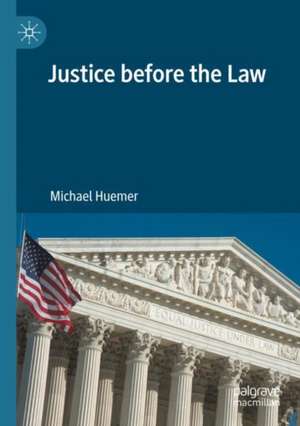Justice before the Law
Autor Michael Huemeren Limba Engleză Paperback – 7 sep 2021
· The philosophical basis for judgments about rights and justice
· The problems of overcriminalization and mass incarceration
· Abuse of power by police and prosecutors
· The injustice of plea bargaining
· The appropriateness of jury nullification
· The authority of the law, or the lack thereof
Justice Before the Law is essential reading for everyone interested in legal ethics, the rule of law, and criminal justice. It is also ideal for students of legal philosophy.
Preț: 220.33 lei
Nou
Puncte Express: 330
Preț estimativ în valută:
42.16€ • 45.79$ • 35.42£
42.16€ • 45.79$ • 35.42£
Carte tipărită la comandă
Livrare economică 22 aprilie-06 mai
Preluare comenzi: 021 569.72.76
Specificații
ISBN-13: 9783030675424
ISBN-10: 3030675424
Pagini: 373
Ilustrații: IX, 373 p.
Dimensiuni: 148 x 210 x 27 mm
Greutate: 0.5 kg
Ediția:1st ed. 2021
Editura: Springer International Publishing
Colecția Palgrave Macmillan
Locul publicării:Cham, Switzerland
ISBN-10: 3030675424
Pagini: 373
Ilustrații: IX, 373 p.
Dimensiuni: 148 x 210 x 27 mm
Greutate: 0.5 kg
Ediția:1st ed. 2021
Editura: Springer International Publishing
Colecția Palgrave Macmillan
Locul publicării:Cham, Switzerland
Cuprins
Part I: Foundations for a Defense of Justice.- Chapter 1. Introduction. - Chapter 2. Law and Morality.- Part II: Legal Injustices.- Chapter 3. Unjust Laws.- Chapter 4. The Price of Justice.- Chapter 5. Conviction by Blackmail.- Chapter 6. Unjust Punishments.- Chapter 7. Abuse of Power.- Part III: In Defense of Justice.- Chapter 8. The Primacy of Justice.- Chapter 9. The Authority of Law.- Chapter 10. Role Playing.- Chapter 11 The Rule of Law.
Notă biografică
Michael Huemer is Professor of Philosophy at the University of Colorado, USA. He is the author of more than seventy articles in ethics, epistemology, political philosophy, and metaphysics, as well as six bestselling philosophy books, including Ethical Intuitionism (2005), The Problem of Political Authority (2012) and Dialogues on Ethical Vegetarianism (2019).
Textul de pe ultima copertă
America’s legal system harbors serious, widespread injustices. Many defendants are sent to prison for nonviolent offenses, including many victimless crimes. Convicts often serve draconian sentences in crowded prisons rife with abuse. Almost all defendants are convicted without trial because prosecutors threaten defendants with drastically higher sentences if they request a trial. Most Americans are terrified of encountering any kind of legal trouble, knowing that both civil and criminal courts are extremely slow, unreliable, and expensive to use. This book explores the largest injustices in the legal system and what can be done about them. Besides proposing institutional reforms, the author argues that prosecutors, judges, lawyers, and jury members ought to place justice before the law – for example, by refusing to enforce unjust laws or impose unjust sentences. Issues addressed include:
· The philosophical basis for judgments about rights and justice
· The problems of overcriminalization and mass incarceration
· Abuse of power by police and prosecutors
· The injustice of plea bargaining · The appropriateness of jury nullification
· The authority of the law, or the lack thereof
Justice Before the Law is essential reading for everyone interested in legal ethics, the rule of law, and criminal justice. It is also ideal for students of legal philosophy.
· The problems of overcriminalization and mass incarceration
· Abuse of power by police and prosecutors
· The injustice of plea bargaining · The appropriateness of jury nullification
· The authority of the law, or the lack thereof
Justice Before the Law is essential reading for everyone interested in legal ethics, the rule of law, and criminal justice. It is also ideal for students of legal philosophy.
Caracteristici
Includes coverage of police violence and the issues surrounding ethnicity By the author of The Problem of Political Authority, the winner of the 2013 PROSE award for philosophy Argues that prosecutors, judges, lawyers, and jury members ought to place justice before the law
